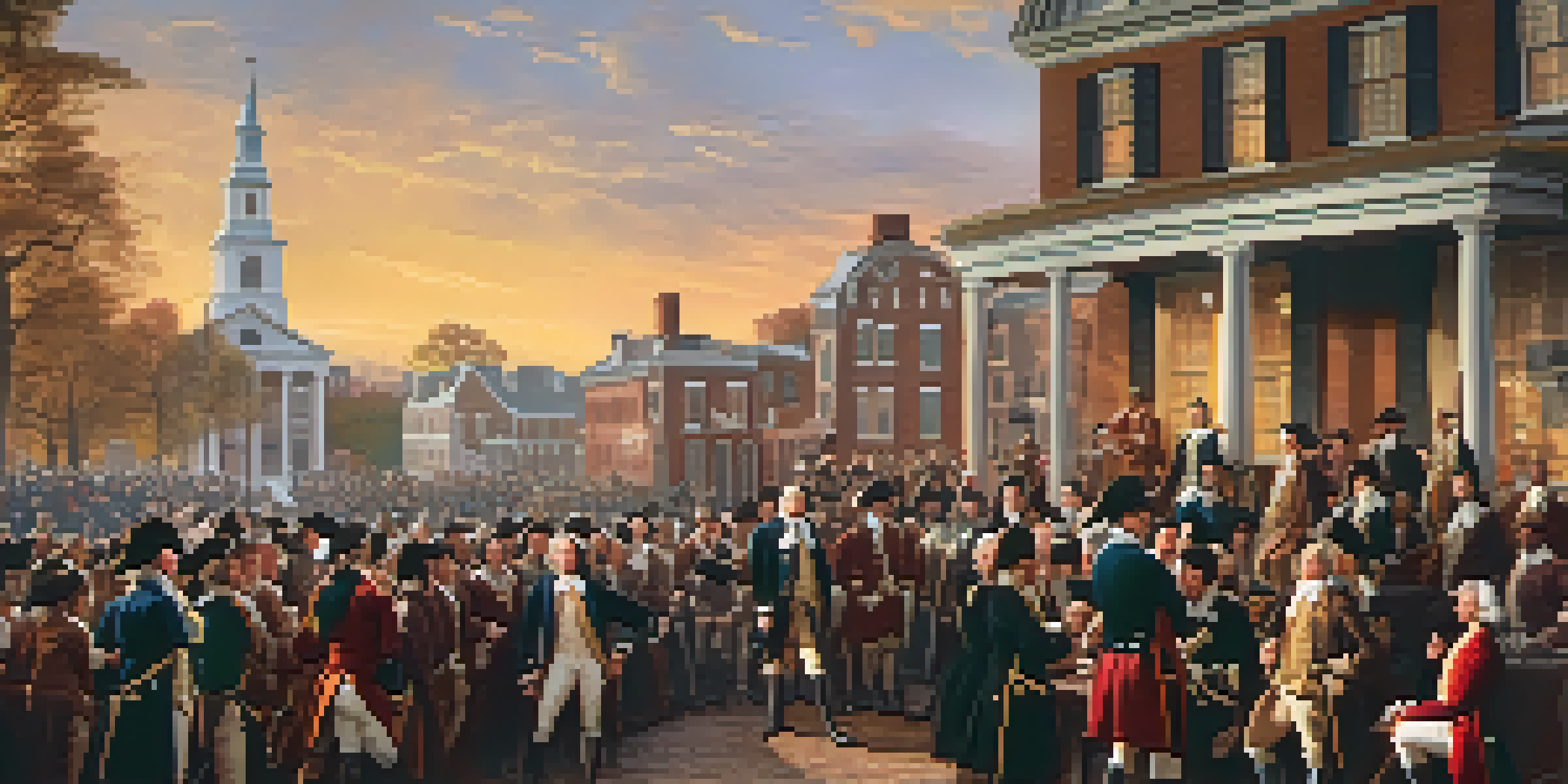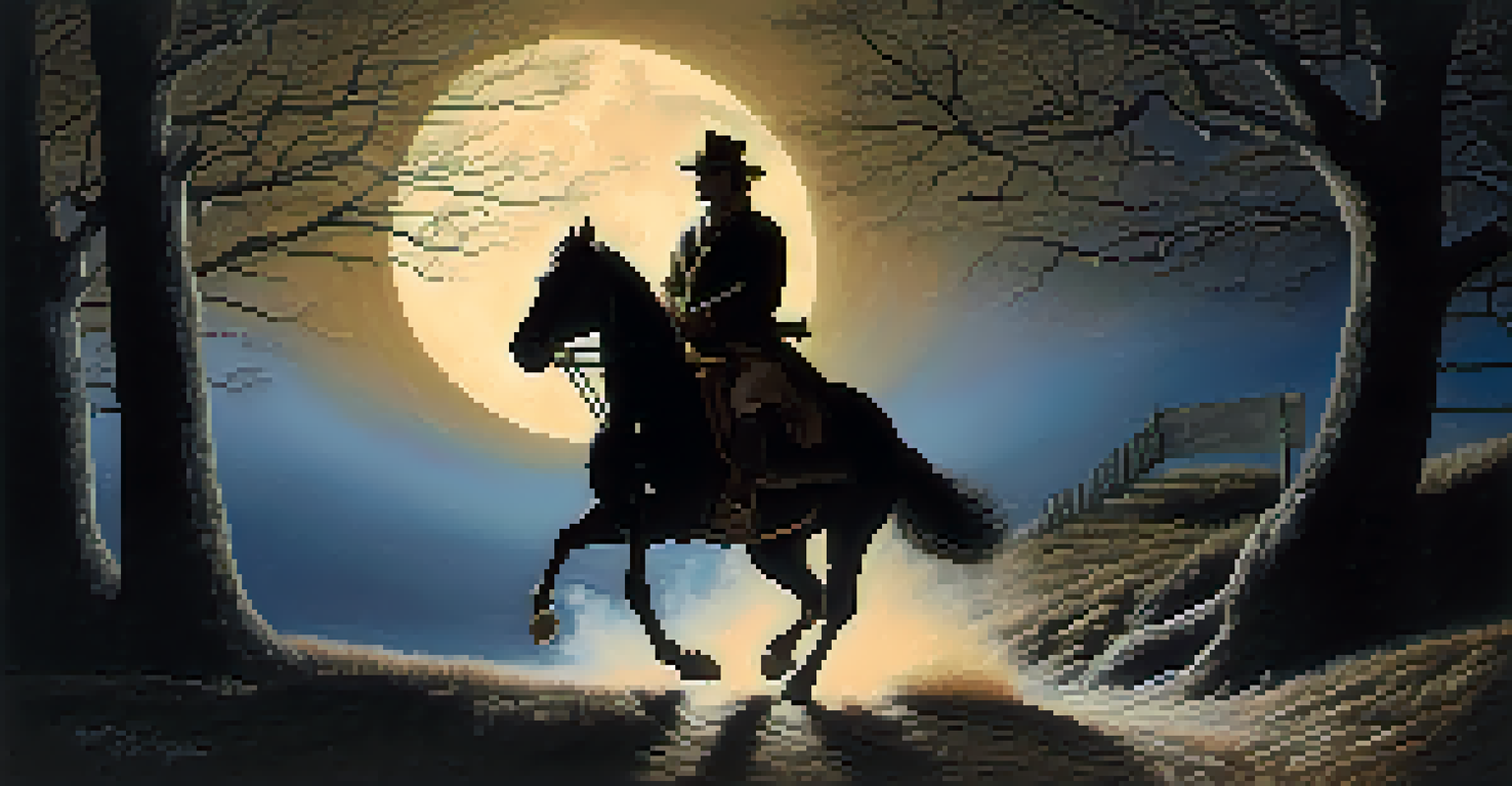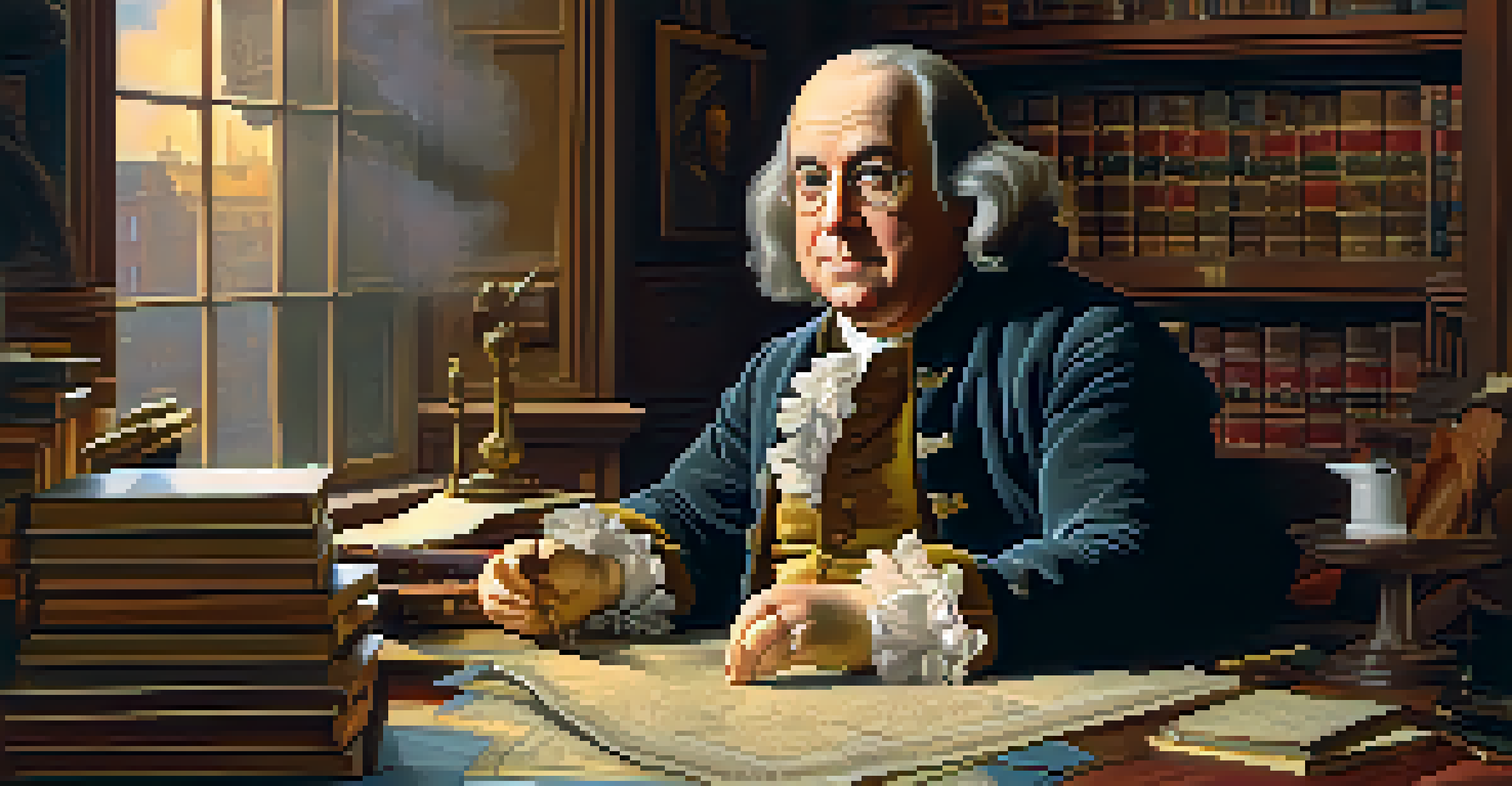Key Figures of Boston's Revolutionary Movement Revealed

Samuel Adams: The Firebrand of the Revolution
Samuel Adams is often hailed as the architect of the American Revolution. His passionate speeches and writings stirred the hearts of many Bostonians, igniting a fierce desire for independence. Adams was not just a politician; he was a master of grassroots organizing, rallying citizens to protest against British taxation.
The pen is mightier than the sword.
One of his most notable achievements was his role in the Boston Tea Party, a bold act of defiance against the Tea Act of 1773. This event not only symbolized the growing unrest but also showcased Adams' ability to mobilize people for a common cause. His leadership inspired many to join the revolutionary movement, making him a central figure in Boston's fight for freedom.
Adams' legacy is felt even today, as he represents the power of civic engagement and activism. His commitment to liberty and justice reminds us that ordinary citizens can make extraordinary changes when they unite for a shared purpose.
John Hancock: The Wealthy Patriot with a Bold Signature
John Hancock is perhaps best known for his flamboyant signature on the Declaration of Independence. However, his contributions to the revolutionary cause extend far beyond that iconic act. As a wealthy merchant, Hancock used his resources to fund the revolution, demonstrating that financial support was crucial to the fight against British rule.

Hancock served as the President of the Second Continental Congress, where he played a vital role in the early stages of America’s quest for independence. His charisma and leadership helped to rally support among delegates, making him an influential figure during those formative years. He was also involved in the Boston Tea Party, showcasing his commitment to the cause.
Grassroots Activism Ignited Revolution
Samuel Adams' ability to rally citizens and organize protests played a crucial role in sparking the American Revolution.
His life is a testament to the idea that wealth can be used for the greater good. Hancock's willingness to risk his fortune for the revolution exemplifies the sacrifices made by many patriots and serves as a reminder that true leadership often involves putting community needs above personal gain.
Paul Revere: The Messenger of the Revolution
Paul Revere is best remembered for his midnight ride to warn the colonists of the approaching British troops. His famous phrase, 'The British are coming!' has become synonymous with his legacy, but his role in the revolution was much broader. Revere was a skilled silversmith and an active member of the Sons of Liberty, using his talents to contribute to the cause in various ways.
United we stand, divided we fall.
Revere's ride on April 18, 1775, was not just a solo effort; it was part of a larger network of spies and messengers that helped relay crucial information. His journey through the night underscored the urgency of the moment, galvanizing colonists to prepare for the imminent conflict. This act of bravery exemplifies the spirit of collaboration that characterized the revolutionary movement.
His story is a powerful reminder of the impact of individual actions on collective history. Revere's commitment to his community and his willingness to take risks for the cause highlight the importance of courage and determination in the face of adversity.
Benjamin Franklin: The Diplomat and Innovator
Benjamin Franklin was a man of many talents—an inventor, philosopher, and statesman. His contributions to the revolutionary movement were instrumental, particularly in securing French support for the American cause. Franklin's diplomatic efforts in Europe showcased his ability to navigate complex political landscapes, making him a key figure in the revolution.
Beyond diplomacy, Franklin's innovative spirit led to advancements in various fields, including electricity and public health. His inventions and ideas not only benefited the colonies but also reflected the Enlightenment ideals that fueled revolutionary thought. Franklin's emphasis on reason and science inspired many to question traditional authority and seek new forms of governance.
Wealth and Leadership Combined
John Hancock's financial support and leadership during the early revolutionary efforts showcased how resources could be leveraged for the greater good.
Franklin's legacy illustrates the interconnectedness of innovation and leadership. His ability to think outside the box and advocate for change serves as an inspiration for future generations, reminding us that progress often stems from a blend of creativity and courage.
Thomas Paine: The Voice of the Common Man
Thomas Paine emerged as a powerful voice for independence through his pamphlet 'Common Sense.' Published in 1776, it argued for the colonies’ separation from Britain in a clear and compelling manner, making the case accessible to the average citizen. Paine's ability to articulate the frustrations of the colonists helped galvanize public opinion towards revolution.
His writings not only inspired immediate action but also laid the philosophical groundwork for the new nation. Paine's emphasis on democracy and individual rights resonated deeply with the revolutionary ideals, encouraging many to join the fight for freedom. His words acted as a unifying force, pushing people to envision a future free from tyranny.
Paine's story underscores the power of the written word in shaping public discourse. His dedication to empowering the common man reminds us that everyone has a role to play in the pursuit of justice and equality, reinforcing the notion that ideas can spark monumental change.
Mercy Otis Warren: The Poet and Political Activist
Mercy Otis Warren was a trailblazer in her own right, using her pen to advocate for independence and women's rights. As a playwright and poet, she crafted powerful works that critiqued British rule and inspired her fellow colonists. Warren's ability to weave political commentary into her writing made her an influential figure in the revolutionary movement.
Her friendships with prominent patriots, such as Samuel Adams and Thomas Jefferson, allowed her to engage in crucial political discussions. Warren's insights and writings contributed to shaping public opinion, especially regarding the role of women in the revolution. She believed that women had a stake in the fight for liberty, paving the way for future generations to advocate for their rights.
Courage and Community Action Matter
Paul Revere's midnight ride exemplifies how individual bravery and community collaboration were essential in mobilizing the colonists against British rule.
Warren's legacy serves as a reminder that the revolutionary movement was not solely a male endeavor. Her commitment to social change and her role as a public intellectual illustrate the importance of diverse voices in shaping history, highlighting that activism can take many forms.
George Washington: The Reluctant Hero
George Washington is often celebrated as the father of the nation, but his journey to that title was marked by reluctance and humility. Initially hesitant to take command of the Continental Army, Washington ultimately rose to the occasion, leading the troops to victory against the British. His leadership during the Revolutionary War was crucial, instilling hope and determination among the soldiers.
Washington’s military strategies, coupled with his ability to inspire loyalty, transformed a ragtag group of soldiers into a formidable fighting force. His retreat from New York City and the surprise attack at Trenton are just two examples of his tactical brilliance. Washington’s resilience in the face of adversity became a symbol of the revolutionary spirit.

After the war, Washington’s decision to step down from power rather than seeking to be a king solidified his legacy as a true leader. His commitment to democracy and governance by the people laid the foundation for the United States, reminding us that true leadership is about service, not ambition.
The Legacy of Boston's Revolutionary Figures
The key figures of Boston's revolutionary movement each played a unique role in shaping the fight for independence. From fiery speeches and bold actions to compelling writings and strategic leadership, their contributions created a tapestry of resistance against British rule. Together, they inspired a generation to stand up for their rights and liberties.
Their stories remind us of the diverse voices that contributed to the revolution, highlighting that change often comes from unexpected places. Each individual's passion, creativity, and commitment to a cause fueled a collective movement that altered the course of history. Their legacies continue to inspire modern movements for justice and equality.
As we reflect on their contributions, it's essential to recognize the enduring impact of their actions. The revolutionary spirit they embodied serves as a powerful reminder that ordinary people can achieve extraordinary results when united by a common goal, reinforcing the idea that history is shaped by those willing to fight for what they believe in.